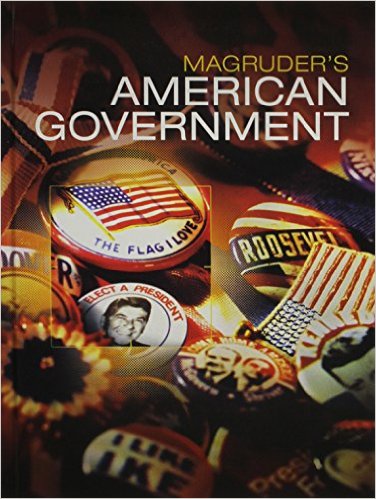
Magruder’s American Government
1st Edition
ISBN: 9780133306996
Textbook solutions
All Solutions
Section 1-2: Types of Government
Exercise 1
Step 1
1 of 3
Democracy is based on the idea that sovereignty is in the hands of the people. Even though the government holds the power, the way the power is used should be for the people, for what the people want. Democracy comes in two forms: direct democracy and indirect democracy.
Step 2
2 of 3
**Direct democracy** or pure democracy translates into public policies (laws) being made by the government, derived from what the people want. An early example of such a government is Ancient Greece, where people gathered in a central place where they discussed, made proposals, and passed laws based on majority approval. With this, we can say that direct democracy is beneficial for smaller communities that face problems that are easier to solve and are of a more simple manner.
Step 3
3 of 3
**Indirect democracy** is the way the United States works nowadays. People elect a smaller political group that aims to represent their will and act within the system according to their viewpoints. That is why this form of democracy is called representative democracy or indirect democracy. It indirectly represents the will of the people and the policies they want. The job of the representatives is to make and execute laws, making them responsible and accountable for their actions.
Exercise 2
Result
1 of 1
In the general run of things, all three forms of government are based on working for the will of the people, they only differ in exactly how power is exercised (also geographical basis). This means that all of their power is based on a law of how they function, therefore they are bound by the law. All three forms aim to govern the state, therefore their power is exerted in different ways based on the geographical basis of the distribution of power. All three forms exercise their power through government, based on their form. They are all generally democratic in nature, the purpose of their forms is to find a suitable way to arrange the “burden”.
Exercise 3
Result
1 of 1
A unitary government that has a democratic form, when the central agency is a government which is in accordance with the will of the people. However, if a government that holds all power through a single central agency over which a ruler has an absolute power, then it could be of a dictatorial form because a ruler has power over the central agency that runs the state.
Exercise 4
Result
1 of 1
A major motive of democracies to interfere with dictatorial states is that democracies are based on an ideology that people have and know their rights and have personal freedom. It is claimed that in a democratic form of government it is only just that way. In a dictatorial form of government, people often pay the price for their personal rights and freedom because the dictatorial state exercises power over all human affairs, concerns and rights that than leads to cutting people off in their rights and freedom. This is the part where some believe that the fact that a dictatorship has absolute power over everything makes it dangerous, therefore democracies should take measures to prevent dictatorial states from invading other one’s. This can upset the balance of the economic system, which benefits no one. Just imagine German Nazi’s taking over the globe. Since a democratic ideology supports the idea of human rights and freedoms, it is only right that a democratic state that is strong enough should intervene in a dictatorial actions that show risk of breaking human rights. A dictatorial state exercising its power in a way that makes people suffer, especially if it is exercised on a foreign state (invasion as the ultimate dictatorial goal), or if it is generally speaking inhumane and immoral in nature. On the other hand, each state should have its own independence to run it as it prefers figuratively. If a dictatorial state creates a healthy system where everyone has their rights, who is to stop them. As long as it doesn’t break basic human rights and privileges that everyone has a right to.
Exercise 5
Result
1 of 1
The executive and legislative branches are both *independen*t of one another and *coequal*. Meaning they cannot interfere with each other’s work. The purpose of the executive branch is to make the laws, and the purpose of the legislature is to execute those laws, so *their powers differ*. These two branches are independent of each other, but if there is no law, there is nothing to execute or oversee, therefore *making them related*. Also, it is their job to keep each other from transgressing. This is possible because they have some restricted power over each other.
unlock

